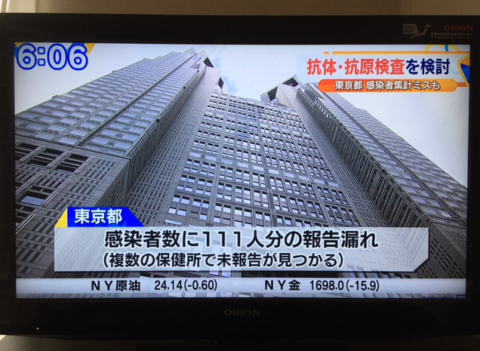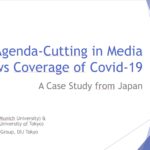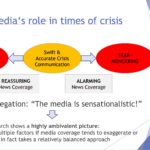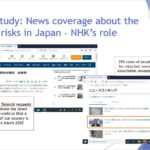
Download
Venue
Online (Zoom meeting)
Registration Info
Registration for this online event is no longer possible.
Please subscribe to our DIJ Newsletter to stay informed about our research activities, events, and publications:
Agenda-Cutting in Media News Coverage of Covid-19:
A Case Study from Japan
October 20, 2020 / 18:30h (JST)
Yosuke Buchmeier, LMU Munich/DIJ Tokyo
In liberal democracies, there is the expectation that the role of mass media is to provide swift and accurate information to the public – especially in times of crisis such as the ongoing Covid-19 pandemic. Risk communication is particularly challenging for journalists as they have to balance the circulation of precise information on dangers and the avoidance of fear-mongering. This presentation addressed the question of how the Covid-19 crisis has been covered in the Japanese media, primarily focusing on television news coverage of the public broadcaster NHK. This research project is based on the theoretical concept of ‘agenda-cutting’, which is rather novel in the field of communication studies. Agenda-cutting describes the phenomenon when a relevant societal issue is deliberately de-emphasized, entirely omitted or removed from a news agenda.
The presentation drew on a case study of the news coverage about the Covid-19 risks in Japan to examine tendencies and patterns for agenda-cutting. Thereby, the results of a content analysis can be contrasted with epidemiological data. Overall, the preliminary findings suggest that the risks of a spread in Tokyo had been diminished in the news coverage ahead of the official postponement of the Olympic Games, which provides empirical evidence for the agenda-cutting hypothesis. Furthermore, this case study hints at general challenges of journalism in times of crisis, and it reveals the peculiar predicament of a semi-independent media organization divided between serving the public’s demand for accurate information, on the one hand, and following a political agenda on the other hand.
Yosuke’s presentation was followed by a lively Q&A session with many questions, comments, and suggestions. For instance, the participants addressed the chances and limitations of the agenda-cutting operational model and discussed further aspects that could be interesting for the analysis, e.g. how citizens or official authorities are portrayed in the media. The integration and/or comparison with international coverage on Covid-19 could also provide valuable insights.
Yosuke Buchmeier is a PhD candidate at LMU Munich. In 2020, he was a doctoral fellow at the DIJ and a visiting researcher at the Interfaculty Initiative in Information Studies at The University of Tokyo, with Prof. Kaori Hayashi. His main research interests concern media, journalism and democracy in Japan, in particular the representation of politics, economics and society in news coverage. His recent article “Towards a Conceptualization and Operationalization of Agenda-Cutting: A Research Agenda for a Neglected Media Phenomenon” was published in the journal ‘Journalism Studies’ (2020) and is available open access (https://doi.org/10.1080/1461670X.2020.1809493).



